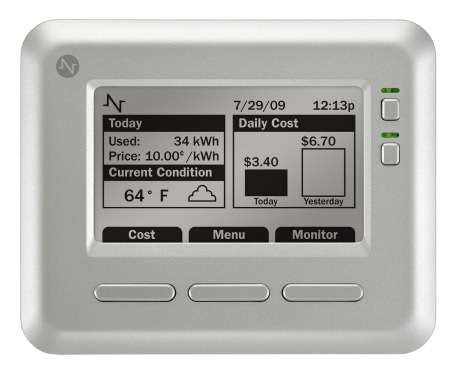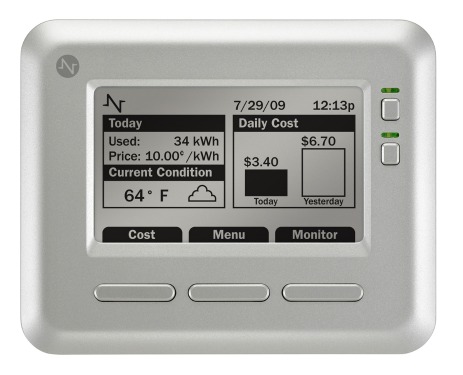 The Tendril Insight in-home display.Photo: Tendril“Smart appliances” are part of a Jetsons-like future that never seems to completely arrive. Battery-powered sedans may now cruise the streets of San Francisco, but my dishwasher is still as dumb as a box of rocks.
The Tendril Insight in-home display.Photo: Tendril“Smart appliances” are part of a Jetsons-like future that never seems to completely arrive. Battery-powered sedans may now cruise the streets of San Francisco, but my dishwasher is still as dumb as a box of rocks.
But prospects that your refrigerator will someday be able to ping your washing machine and the local utility’s smart grid to coordinate the best times to defrost and to do a load of clothes — say, when electricity rates are low or renewable energy sources come online — seemed to take a step forward Friday.
Tendril, a home energy management software company, and Whirlpool announced a deal to incorporate the startup’s technology in the appliance maker’s refrigerators, dishwashers, ranges, and refrigerators.
“This will forever change how consumers interact with their appliances and how they conserve energy in their homes,” Adrian Tuck, Tendril’s chief executive, said in a statement. “We believe this will help consumers become increasingly energy-wise, and in the process, help utilities effectively manage peak loads on the grid.”
Tendril signed a similar deal with General Electric in 2009.
Conspicuously absent from Friday’s announcement was a date when we can start to buy iFridges.
“This timeline is dependent on the development of an open, global standard and appropriate policies to reward consumers, manufacturers and utilities — which was supposed to happen by the end of 2010,” Sheila O’Neill, a Tendril spokeswoman, told me in an email.
“Obviously we did not have an open standard by the end of 2010,” she added. “By the end of 2011, Whirlpool Corporation will have the capacity to produce a million or more smart appliances. Technology is certainly not the gating factor. As soon as utilities are ready to roll out Time of Use (TOU) and there is a common industry HAN communication standard available, Whirlpool Corporation will be ready to deliver a solution.”
Translation: Industry and utilities first need to get their acts together so that a GE dryer can talk to a Whirlpool washer, not to mention thousands of different local electricity providers. And regulators and utilities need to change the way electricity rates are set in real time so people who consume less electricity when demand spikes pay less than those that use more.
It took years before advances in battery technology put the first mass-market electric cars on the road, but smart appliances are largely ready for prime time — as is other smart-grid-related tech. But reengineering the century-old electricity distribution system, which is Balkanized by myriad utilities and local, state, and federal regulators is a gargantuan task.
In other words, don’t expect Apple to get into the appliance business anytime soon.




